The economy is very peaceful today. That's bad news.
Here's why worker unrest is good

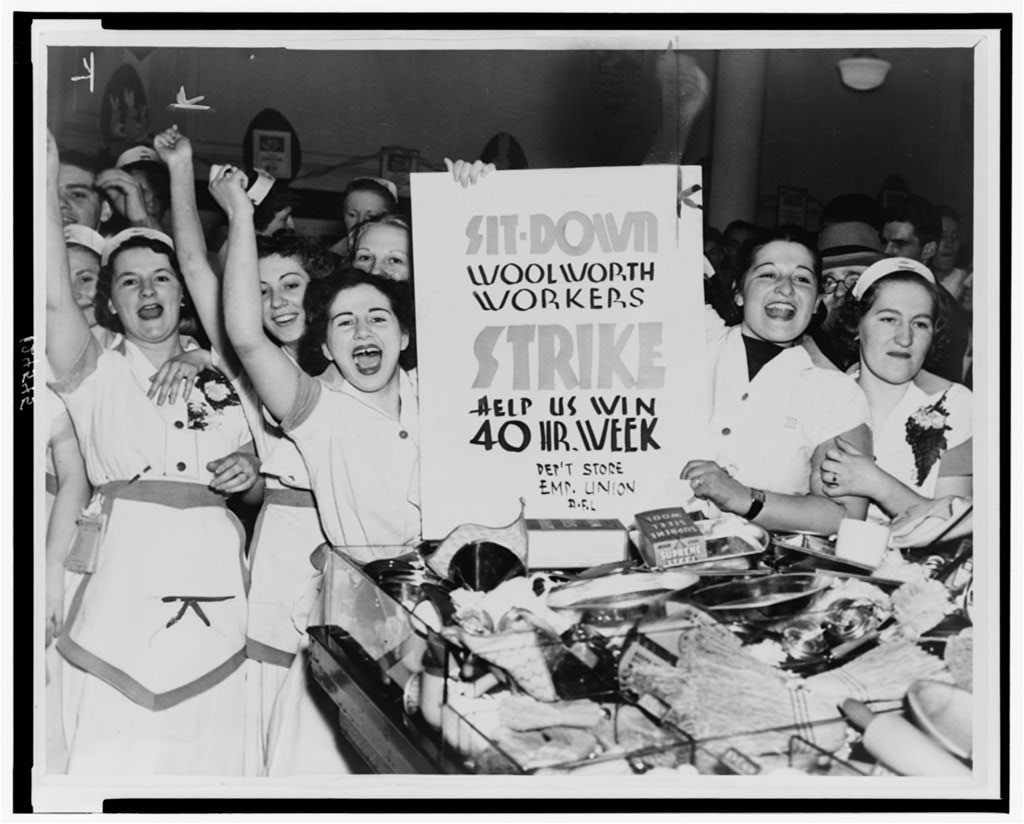
A free daily email with the biggest news stories of the day – and the best features from TheWeek.com
You are now subscribed
Your newsletter sign-up was successful
If you want an uncomfortable but useful insight into American employment, there's a new report from the Bureau of Labor Statistics you should see.
It's not terribly complicated. It just documents the number of work stoppages involving 1,000 workers or more — either from strikes or lockouts — going back from 2015 to 1947. As Ben Casselman noted at FiveThirtyEight, in 1952, a whopping 470 work stoppages happened across the American economy. Fast forward to last year, and there were only 12.
So the American economy has gotten a lot more peaceful in the last few decades. Good, right?
The Week
Escape your echo chamber. Get the facts behind the news, plus analysis from multiple perspectives.

Sign up for The Week's Free Newsletters
From our morning news briefing to a weekly Good News Newsletter, get the best of The Week delivered directly to your inbox.
From our morning news briefing to a weekly Good News Newsletter, get the best of The Week delivered directly to your inbox.
No. That's the insight you can dig out of this report. The essence of employment is bargaining power: Americans come together in companies and firms and collective activities across the economy to produce wealth, and everyone's pay comes out of that production. So the wages of American workers are set by how big a slice of that revenue they can claim, when bargaining with the other stakeholders in their firm like shareholders and management. So if American prosperity is going to be equitable and broadly shared, workers need enough power to contend with CEOs and owners of capital when they all meet at the bargaining table.
Generally speaking, a bargaining table where everyone has roughly equal power is going to be a raucous bargaining, because everyone is making genuine sacrifices. And a raucous bargaining table is what we had mid-century.
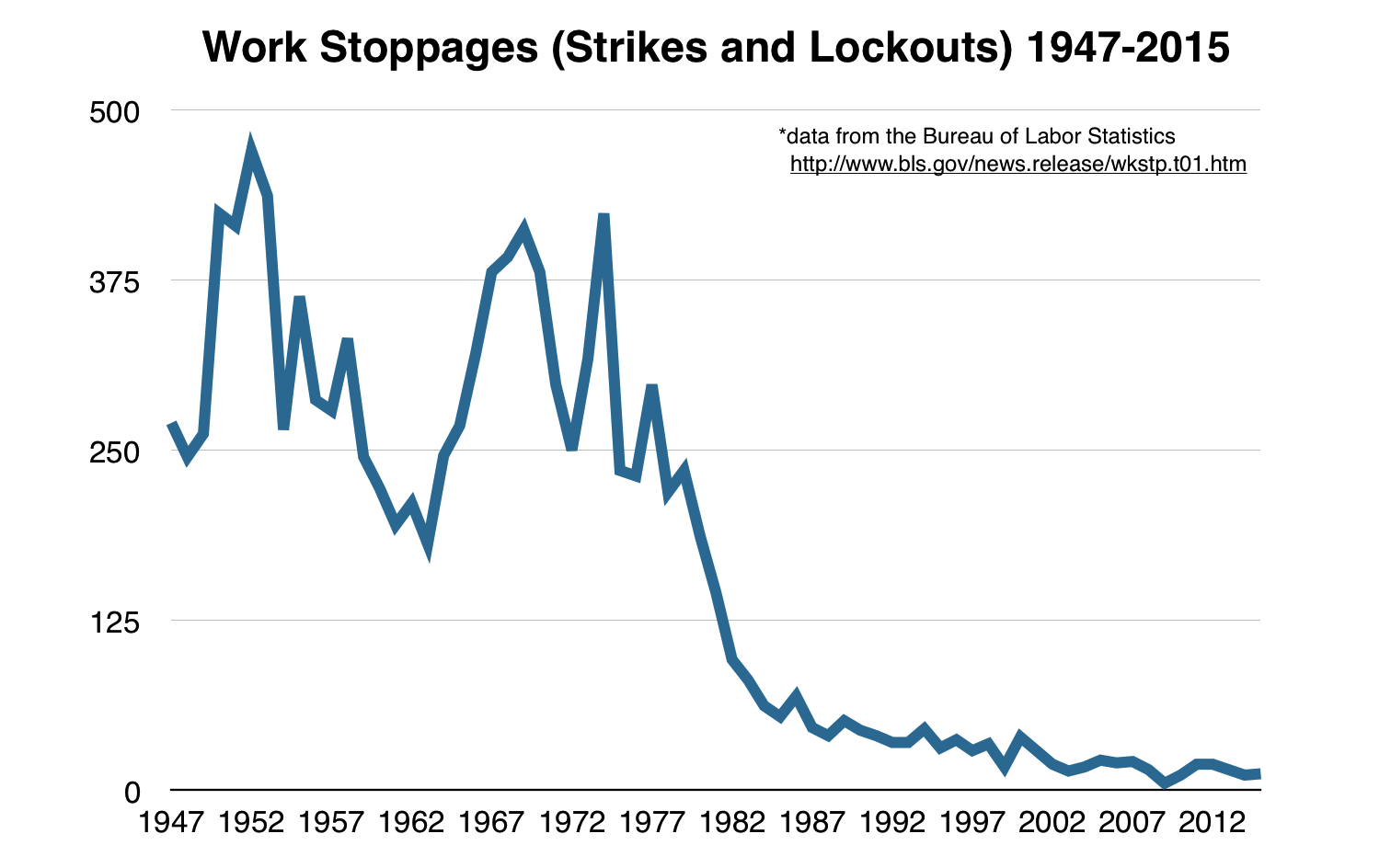
One technical thing to note is that BLS counts both strikes and lockouts as work stoppages. A strike, of course, is when workers temporarily (usually but not necessarily union members) temporarily halt work in a company or industry to enforce their demands on employers. A lockout is when employers temporarily deny work to employees to enforce their demands on workers. So work stoppages measure punches both sides are throwing against the other.
And in many ways that graph understates the scale of the shift. At that peak in 1952, those 470 work stoppages involved 2.7 million workers and 48.8 million idle days. In 1980, it was down to 187 work stoppages, 795,000 workers involved, and 20.8 million idle days. Last year, it was 12 stoppages involving 47,000 workers and 740,000 idle days. Things have calmed down a lot.
A free daily email with the biggest news stories of the day – and the best features from TheWeek.com
Casselman pointed out that the collapse in work stoppages "mirrors the decades-long erosion of union membership." Which is true! And the decline in union density also mirrors the increase in how big a slice of all wealth produced in the economy is claimed by the top 10 percent.
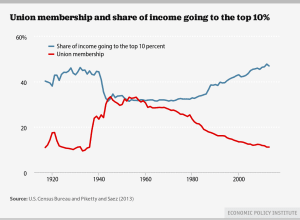
(Graph courtesy of the Economic Policy Institute.)
But the other thing the disappearance of work stoppages mirrors is the disappearance of full employment — the condition where the supply of jobs and the supply of workers are very tight. When that happens, employers are constantly afraid of losing workers to better opportunities elsewhere, which gives workers leverage to bargain for better working conditions, benefits, and pay. Their wages increase and inequality goes down. Unions are certainly another important route to that leverage, but full employment is arguably the most fundamental of all.
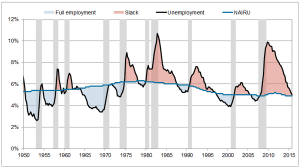
(Graph courtesy of Wall Street Journal economics correspondent Josh Zumbrum.)
As you can see, in the 1950 to 1975 period when work stoppages were common, full employment was also common. Then both disappeared at once.
There's a lot going on there. The collapse of union density — helped along by right-to-work laws and the like — is certainly a big piece. Another is the rise of the big business lobby as a force to be reckoned with in American politics and policymaking. The real value of the minimum wage collapsed in this period. That work stoppage fall-off around 1980 also coincides with the Federal Reserves' decision to drive interest rates through the roof and induce a recession to stop rising inflation. It's generally heralded as a success, and marked a new era of Fed intolerance for inflation above 2 percent. But life for the average American workers has never been the same.
Anyway, the point is this: When things are pleasant for workers — when we're at full employment, when bargaining power is high, and when wages are rising — life is distinctly unpleasant for employers. You can see that below. One of the last bursts of full employment we had was in the late 1990s — and, as it turned out, this was also when small business complaints about labor quality were at their highest:
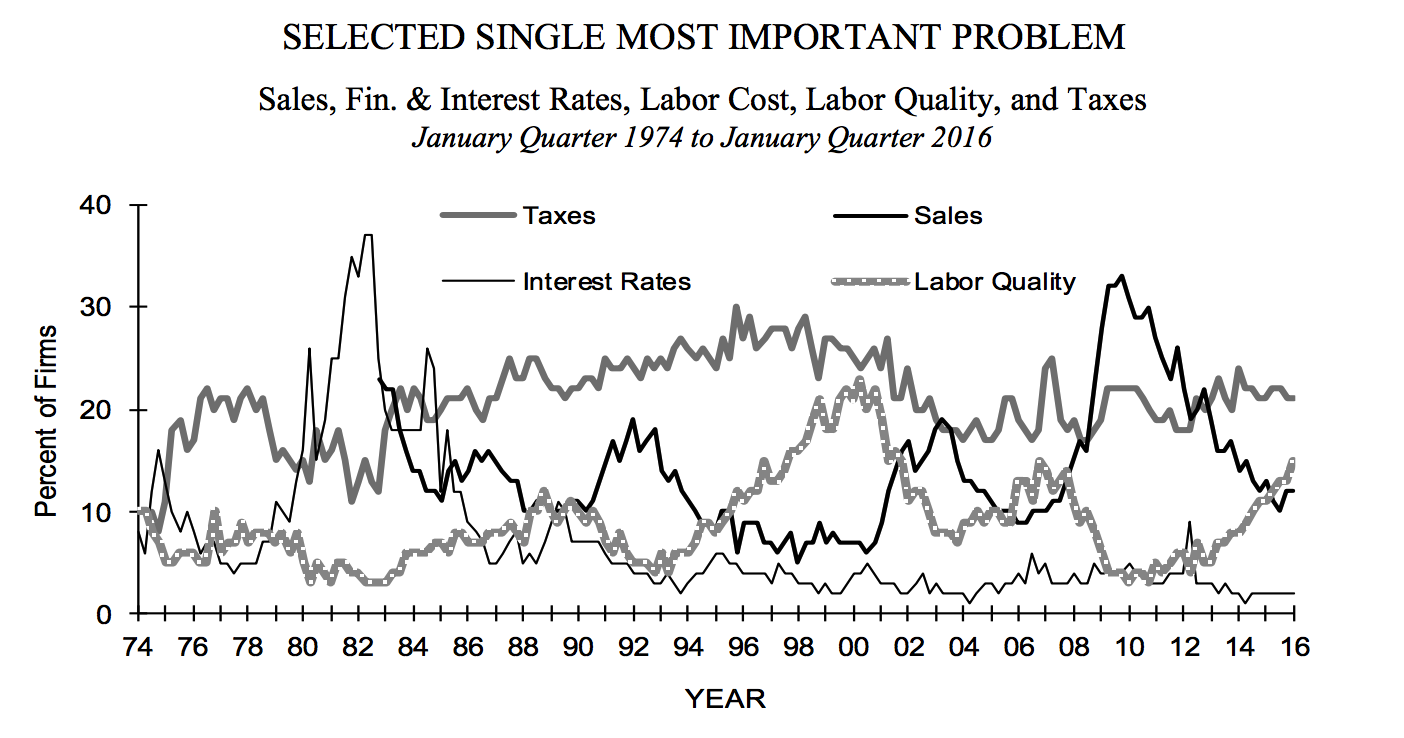
We Americans don't really grapple with the social implications of this. Unions and labor organizing tend to get a bad rap in our culture. It's bad for business (Look at all those work stoppages!) and bad for efficiency. It turns getting a higher income into a communal question of collective leverage, rather than an individual question of rising up the meritocratic ladder under your own prowess. And it transforms the workplace away from an arena for rational hierarchies and civil cooperation, and into an arena for combat and rival power conflicts.
But the truth is economic production is an inescapably collective endeavor. Which makes it a social endeavor. And human beings are not saints: We're greedy, prideful, fearful, and very good at explaining why we should not get less so that someone else can get more. So when we come to the bargaining table as equals, things get messy. That's what we had back in the mid-century.
Now we have a peaceful bargaining table. Which is probably a sign one side is totally dominating the other.
The blunt truth is that distributing the wealth produced by the American economy is a contact sport. Lamenting that fact — and calling on everyone to be less rough and more civil and more cooperative — is a lot easier when you're winning and someone else is getting trounced.
Jeff Spross was the economics and business correspondent at TheWeek.com. He was previously a reporter at ThinkProgress.
-
 Sean Bean brings ‘charisma’ and warmth to Get Birding
Sean Bean brings ‘charisma’ and warmth to Get BirdingThe Week Recommends Surprise new host of RSPB’s birdwatching podcast is a hit
-
 Film reviews: ‘Send Help’ and ‘Private Life’
Film reviews: ‘Send Help’ and ‘Private Life’Feature An office doormat is stranded alone with her awful boss and a frazzled therapist turns amateur murder investigator
-
 Movies to watch in February
Movies to watch in Februarythe week recommends Time travelers, multiverse hoppers and an Iraqi parable highlight this month’s offerings during the depths of winter
